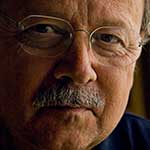Editor’s Note: In March of this year, we were saddened to learn of the passing of renowned Canarian poet and essayist Andrés Sánchez Robayna (1952-2025). At LALT, we feel profound admiration and thankfulness for his illuminating work not only as a writer, but also as a translator and editor of literary magazines, including the groundbreaking Syntaxis. His legacy inspires us to renew our dedication to sharing literature with the world.
LALT managing editor and literary translator Arthur Malcolm Dixon maintained correspondence with Andrés Sánchez Robayna over the course of the last ten years of his life, after translating a number of his poems in collaboration with Daniel Simon, editor-in-chief of World Literature Today. Some of these poems were published in WLT and Asymptote.
At the time of Sánchez Robayna’s death, Arthur Malcolm Dixon was in the process of translating his book-length poem Por el gran mar, a beautifully reflective and moving tribute to the memory of his wife, Marta Ouviña Navarro. We are proud to share an excerpt here, in the poet’s memory.
In the order that I speak of are inclined
All natures, by their destinies diverse,
More or less near unto their origin;
Hence they move onward unto ports diverse
O’er the great sea of being; and each one
With instinct given it which bears it on.
Paradiso, I, 109-114
Translated by Henry Wadsworth Longfellow
I
A wave
slides, mark it,
a wave
in the dying afternoon, the calm,
comes
up to your body,
embrace it
at the very instant
of this spell,
a wave
flows
beneath the stretching clouds, from
what depths,
no,
you know not
of what matter, to
what brink,
what borders unseen to you,
leaving no trace, on
what hillsides of air,
floods
nettle,
tabaibal,
quince,
the rock of beginning
and endless desire,
the sands of the brink in the light
of dazzling midday
and blinding night,
covers
overruling memories
and mocking oblivions,
it is oneness,
perhaps,
what they call (you call)
Oneness,
and in the air
flow
the circles of the One,
the circles that are air itself
above our heads,
circles
that loom
in the air
and pass through it,
float over mountains,
cliffs molded
under the passage of wind,
streets,
parks,
corners
the wind whips and bites,
memory of faces,
memory of days
and nights,
future sinking
in the past
and past flowing
now to your hands,
comes
from the beginning,
returns,
a wave
runs
and then retreats bit by bit
into the breadth,
upon itself,
withdraws
and slowly
returns
on the same sand,
and stretches out,
what wind
has brought it to your arms,
as if in circles,
it goes on, mark it,
slides endless from the sea of youth.
II
The family house under the clouds,
the August morning, arbor,
grapes that hung from light,
I was a possession of presence,
the air plied the white room
and on the bed lay still the imprint of
that body born to lighted dawn.
And then came bells, the call,
summons perhaps of other light,
in fluent tolling echoed
seething joy, hair combed back
by that mother who fits shutters
and reigns in the sheltered air,
the house, the day, the presence.
III
It was just
a beckoning call, an echo
perhaps, from beyond the mountain,
the invisible. Yet how is it
the living knell now dwells in me,
the vibration of bronze and tin
that rings in light and casts it
still within me, lively,
constant?
I was coming
down the shingle path,
the morning sun shone through
the mango trees, the summer
wrapped the red, dry earth.
The bare cliff offered up its stones
to the eye’s pity,
morning lying,
white, sheetlike
in the violence of light.
The waves of bellstrokes
came, distending silence, one long
diastole of sound arriving
from the solar heart.
Gracefully the blue tit
hopped between the cacti.
How is it, now, the joy
of bronze can sound in me, more inner
than my inmost property?
I dwell in bell and knell
just as they dwell in me,
segment of lasting dissipated in eternity.
IV
Unbraced, lost,
I near the borders of memory
as the nocturnal creature nears the fire,
a minor hearth that draws
the thirsty animal towards itself, and night
broadening endlessly around the flame.
Why must the knell fall now, resonant
in rapt concavity,
a temple that accepts, absorbs,
and is its deepest possession,
what gives it meaning, rendered knowledge?
Oh nocturnal morn,
we might call firewood or temple
that rocking of bells that burn
in the dark morning, fire
in an impervious night. And I return,
I prowl around the borders. Memory
takes me to a place to which I come back
not at present but in presence.
They are not the eyes of childhood, now,
that look from me; they are the eyes
of a child reborn in memory.
Translated by Arthur Malcolm Dixon
From Por el gran mar (Galaxia Gutenberg, 2019)
LALT thanks Alejandro Krawietz for granting us permission to publish this text.



